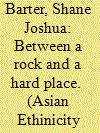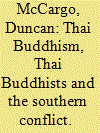|
|
|
Sort Order |
|
|
|
Items / Page
|
|
|
|
|
|
|
| Srl | Item |
| 1 |
ID:
137219


|
|
|
|
|
| Summary/Abstract |
Secessionist movements are often motivated by a sense of exclusion, abuse, and assimilation at the hands of host states. But in waging armed struggles and constructing ethnic nationalisms, they may replicate such grievances against their own minorities. This paper seeks to provide a deeper understanding of how ‘second-order minorities’ respond to secessionist ethno-nationalism. Based on ethnographic research in Aceh, Indonesia, this paper looks to how Javanese, Malay, Alas, and Gayo communities responded to Acehnese secessionism. Aceh’s minorities did not support Aceh’s rebels, opting to flee or resist rebellion. In explaining their reaction, I suggest that the same ethno-nationalist project which united many Acehnese in the secessionist struggle served to repel non-Acehnese communities, leading to ethno-nationalist revivals among Aceh’s minorities and continued tensions in the post-conflict era.
|
|
|
|
|
|
|
|
|
|
|
|
|
|
|
|
| 2 |
ID:
166806


|
|
|
|
|
| Summary/Abstract |
Migration by nature can lead to1 integration. This is possible when a nation-state takes a clear stand on the practices of multiculturalism. Most Asian countries have failed to adopt multiculturalism and rather practice the policy of assimilation. Yet multiculturalism has become popular as this concept incorporates recognition of ethnic and national minorities and supports their cultural identity. Due to longstanding conflict in the southernmost provinces of Thailand, various data suggests that many Malay-Muslims migrated to the upper southern provinces of Thailand in recent years. In this context, internal migration occurred mainly for economic as well as security reasons. Consequently, in some provinces demographic numbers have changed. In the near future, there may be changes in Thai society, especially in the upper southern provinces. The main purpose of this study is to ascertain how the government accommodates internal migration especially in upper southern provinces. In order to develop a multicultural society, the Thai government should nurture minority issues in various ways. Apart from the government, Thai civil society—comprising academics and NGOS—has addressed it from their own perspectives. Still, there is no comprehensive approach to deal with this issue. Aside from the lack of cultural and political integration, Thai society may face severe related challenges to migration in the next decade.
|
|
|
|
|
|
|
|
|
|
|
|
|
|
|
|
| 3 |
ID:
124292


|
|
|
|
|
| Publication |
2013.
|
| Summary/Abstract |
For contemporary Malay/Indonesian speakers, dukun signifies an indigenous healer. Etymologically, however, the word dukun is not native to Malay/Indonesian. Some say dukun is Arabic, but this article claims it is more Persian than Arabic. When fifteenth-century Persian settlers brought the proto-form of the word dukun to the Malay Archipelago, they also brought cosmopolitan notions of Sufism, faith and healing. Eventually orthodox Arab immigrants and Europeans denigrated Sufi healers as 'indigenous'. Dukun became a rhetorical foil demonstrating how superb Western physicians or orthodox Arabs were by comparison. Gradually, the dukun's reputation became intertwined with negative attitudes about 'indigenous' practices.
|
|
|
|
|
|
|
|
|
|
|
|
|
|
|
|
| 4 |
ID:
096566


|
|
|
|
|
| Publication |
2009.
|
| Summary/Abstract |
Thailand's 'southern border provinces' of Pattani, Yala and Narathiwat - along with four districts of neighbouring Songkhla - are the site of fiery political violence characterised by daily killings. The area was historically a Malay sultanate, and was only loosely under Thai suzerainty until the early twentieth century. During the twentieth century there was periodic resistance to Bangkok's attempts to suppress local identity and to incorporate this largely Malay-speaking, Muslim-majority area into a predominantly Buddhist nation-state. This resistance proved most intense during the 1960s and 1970s, when various armed groups (notably PULO [Patani United Liberation Organization] and BRN [Barisan Revolusi Nasional]) waged war on the Thai state, primarily targeting government officials and the security forces. In the early 1980s, the Prem Tinsulanond government brokered a deal with these armed groups and proceeded to co-opt the Malay-Muslim elite. By crafting mutually beneficial governance, security and financial arrangements, the Thai state was able largely to placate local political demands.
|
|
|
|
|
|
|
|
|
|
|
|
|
|
|
|
| 5 |
ID:
101017


|
|
|
|
|
| Publication |
2010.
|
| Summary/Abstract |
Urban renewal is paradoxical. When it happens, someone inevitably will be made worse off despite the inherent implication that "renewal" must be beneficial. This article examines urban renewal in two Malay urban settlements, Kampung Bharu in Malaysia and Geylang Serai in Singapore, comparing and contrasting their development trajectories.
|
|
|
|
|
|
|
|
|
|
|
|
|
|
|
|
|
|
|
|
|